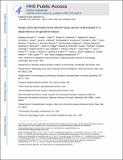Keap1 loss promotes Kras-driven lung cancer and results in dependence on glutaminolysis
Author(s)
Sayin, Volkan I.; Singh, Simranjit X.; LeBoeuf, Sarah E.; Karakousi, Triantafyllia R.; Martinez, Britney; Bronson, Roderick T.; Prigge, Justin R.; Schmidt, Edward E.; Thomas, Craig J.; Goparaju, Chandra; Davies, Angela; Dolgalev, Igor; Heguy, Adriana; Allaj, Viola; Poirier, John T.; Moreira, Andre L.; Rudin, Charles M.; Pass, Harvey I.; Papagiannakopoulos, Thales; Davidson, Shawn M.; Bauer, Matthew R.; Ellis, Donald Christian; Bhutkar, Arjun; Sanchez-Rivera, Francisco Javier; Subbaraj, Lakshmipriya; Vander Heiden, Matthew G.; Jacks, Tyler E.; Romero, Rodrigo,Ph. D.Massachusetts Institute of Technology.; ... Show more Show less
Downloadnihms901248.pdf (449.0Kb)
PUBLISHER_POLICY
Publisher Policy
Article is made available in accordance with the publisher's policy and may be subject to US copyright law. Please refer to the publisher's site for terms of use.
Terms of use
Metadata
Show full item recordAbstract
Treating KRAS-mutant lung adenocarcinoma (LUAD) remains a major challenge in cancer treatment given the difficulties associated with directly inhibiting the KRAS oncoprotein. One approach to addressing this challenge is to define mutations that frequently co-occur with those in KRAS, which themselves may lead to therapeutic vulnerabilities in tumors. Approximately 20% of KRAS-mutant LUAD tumors carry loss-of-function mutations in the KEAP1 gene encoding Kelch-like ECH-associated protein 1 (refs. 2, 3, 4), a negative regulator of nuclear factor erythroid 2-like 2 (NFE2L2; hereafter NRF2), which is the master transcriptional regulator of the endogenous antioxidant response. The high frequency of mutations in KEAP1 suggests an important role for the oxidative stress response in lung tumorigenesis. Using a CRISPR-Cas9-based approach in a mouse model of KRAS-driven LUAD, we examined the effects of Keap1 loss in lung cancer progression. We show that loss of Keap1 hyperactivates NRF2 and promotes KRAS-driven LUAD in mice. Through a combination of CRISPR-Cas9-based genetic screening and metabolomic analyses, we show that Keap1- or Nrf2-mutant cancers are dependent on increased glutaminolysis, and this property can be therapeutically exploited through the pharmacological inhibition of glutaminase. Finally, we provide a rationale for stratification of human patients with lung cancer harboring KRAS/KEAP1- or KRAS/NRF2-mutant lung tumors as likely to respond to glutaminase inhibition.
Date issued
2017-10Department
Massachusetts Institute of Technology. Department of Biology; Koch Institute for Integrative Cancer Research at MITJournal
Nature Medicine
Publisher
Nature Publishing Group
Citation
Romero, Rodrigo et al. “Keap1 Loss Promotes Kras-Driven Lung Cancer and Results in Dependence on Glutaminolysis.” Nature Medicine (October 2017): 1362–1368 © 2017 Nature America, Inc., part of Springer Nature
Version: Author's final manuscript
ISSN
1078-8956
1546-170X